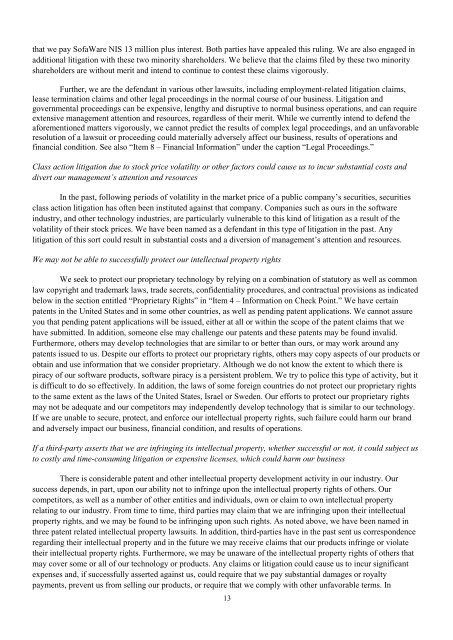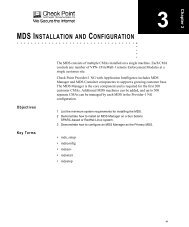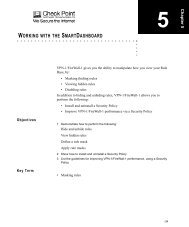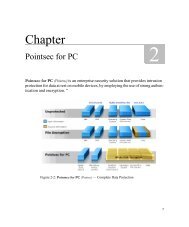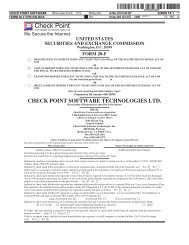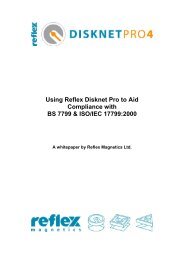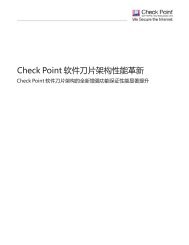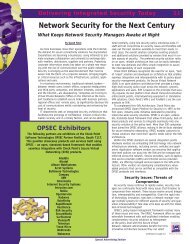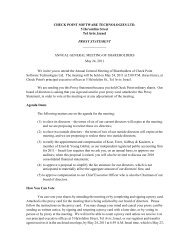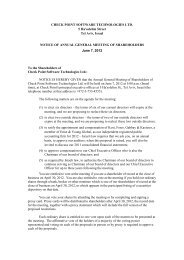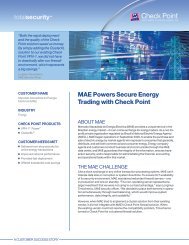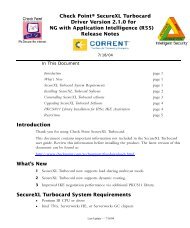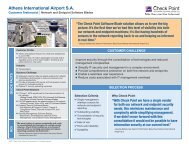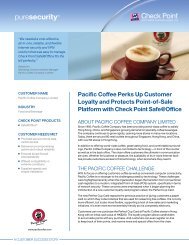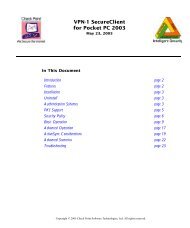FORM 20-F - Check Point
FORM 20-F - Check Point
FORM 20-F - Check Point
You also want an ePaper? Increase the reach of your titles
YUMPU automatically turns print PDFs into web optimized ePapers that Google loves.
that we pay SofaWare NIS 13 million plus interest. Both parties have appealed this ruling. We are also engaged in<br />
additional litigation with these two minority shareholders. We believe that the claims filed by these two minority<br />
shareholders are without merit and intend to continue to contest these claims vigorously.<br />
Further, we are the defendant in various other lawsuits, including employment-related litigation claims,<br />
lease termination claims and other legal proceedings in the normal course of our business. Litigation and<br />
governmental proceedings can be expensive, lengthy and disruptive to normal business operations, and can require<br />
extensive management attention and resources, regardless of their merit. While we currently intend to defend the<br />
aforementioned matters vigorously, we cannot predict the results of complex legal proceedings, and an unfavorable<br />
resolution of a lawsuit or proceeding could materially adversely affect our business, results of operations and<br />
financial condition. See also “Item 8 – Financial Information” under the caption “Legal Proceedings.”<br />
Class action litigation due to stock price volatility or other factors could cause us to incur substantial costs and<br />
divert our management’s attention and resources<br />
In the past, following periods of volatility in the market price of a public company’s securities, securities<br />
class action litigation has often been instituted against that company. Companies such as ours in the software<br />
industry, and other technology industries, are particularly vulnerable to this kind of litigation as a result of the<br />
volatility of their stock prices. We have been named as a defendant in this type of litigation in the past. Any<br />
litigation of this sort could result in substantial costs and a diversion of management’s attention and resources.<br />
We may not be able to successfully protect our intellectual property rights<br />
We seek to protect our proprietary technology by relying on a combination of statutory as well as common<br />
law copyright and trademark laws, trade secrets, confidentiality procedures, and contractual provisions as indicated<br />
below in the section entitled “Proprietary Rights” in “Item 4 – Information on <strong>Check</strong> <strong>Point</strong>.” We have certain<br />
patents in the United States and in some other countries, as well as pending patent applications. We cannot assure<br />
you that pending patent applications will be issued, either at all or within the scope of the patent claims that we<br />
have submitted. In addition, someone else may challenge our patents and these patents may be found invalid.<br />
Furthermore, others may develop technologies that are similar to or better than ours, or may work around any<br />
patents issued to us. Despite our efforts to protect our proprietary rights, others may copy aspects of our products or<br />
obtain and use information that we consider proprietary. Although we do not know the extent to which there is<br />
piracy of our software products, software piracy is a persistent problem. We try to police this type of activity, but it<br />
is difficult to do so effectively. In addition, the laws of some foreign countries do not protect our proprietary rights<br />
to the same extent as the laws of the United States, Israel or Sweden. Our efforts to protect our proprietary rights<br />
may not be adequate and our competitors may independently develop technology that is similar to our technology.<br />
If we are unable to secure, protect, and enforce our intellectual property rights, such failure could harm our brand<br />
and adversely impact our business, financial condition, and results of operations.<br />
If a third-party asserts that we are infringing its intellectual property, whether successful or not, it could subject us<br />
to costly and time-consuming litigation or expensive licenses, which could harm our business<br />
There is considerable patent and other intellectual property development activity in our industry. Our<br />
success depends, in part, upon our ability not to infringe upon the intellectual property rights of others. Our<br />
competitors, as well as a number of other entities and individuals, own or claim to own intellectual property<br />
relating to our industry. From time to time, third parties may claim that we are infringing upon their intellectual<br />
property rights, and we may be found to be infringing upon such rights. As noted above, we have been named in<br />
three patent related intellectual property lawsuits. In addition, third-parties have in the past sent us correspondence<br />
regarding their intellectual property and in the future we may receive claims that our products infringe or violate<br />
their intellectual property rights. Furthermore, we may be unaware of the intellectual property rights of others that<br />
may cover some or all of our technology or products. Any claims or litigation could cause us to incur significant<br />
expenses and, if successfully asserted against us, could require that we pay substantial damages or royalty<br />
payments, prevent us from selling our products, or require that we comply with other unfavorable terms. In<br />
13


